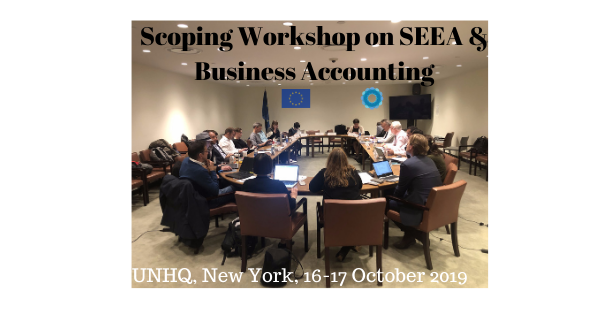Scoping Workshop on the SEEA and Business Accounting

There is an increasing recognition within the private sector of the importance of including the environment in business decision making and company reporting. Similarly, governments are attempting to better understand the relationships between the environment and economy, for instance through natural capital accounting and the SEEA. To explore potential synergies in bringing together public and private sector approaches in terms of natural capital accounting, UNSD held a Scoping Workshop on the SEEA and Business Accounting on 16-17 October 2019, as part of the EU-funded Natural Capital Accounting and Valuation of Ecosystem Services (NCAVES) project.
Approximately 25 participants from the private sector, national statistical offices, international organizations and reporting and standards setting organizations gathered at UN Headquarters in New York to advance these issues. The public and private sector each provided their unique perspectives in terms of natural capital accounting and reporting. In particular, private sector participants learned more about the SEEA Experimental Ecosystem Accounting (SEEA-EEA) and what national statistical offices can offer in terms of supporting data. For example, participants discussed how spatially explicit maps of ecosystems and the services they provide could support business accounting and reporting across supply and value chains.
In addition, public sector participants learned more about the different approaches taken across businesses through the presentation of four different case studies. Representatives from eftec; DOW Chemical and the Nature Conservancy; Kering; and the Biological Diversity Protocol shared their efforts to bring nature and the environment into business decision making and reporting. Approaches ranged from using environmental profit and loss (E P&L) techniques by Kering to using an accounting framework for biodiversity (Biological Diversity Protocol). In addition, participants learned about the first case of a company applying the SEEA-EEA and the benefits they have derived from using this approach.
At the end of the two days, participants discussed the contents of a roadmap for future alignment between public and private sector approaches. Participants agreed that pilots bringing together the public and private sector could be useful in determining the specific data needs of businesses and how the public sector could contribute to those helping meet those data needs through ecosystem accounting. In addition, participants agreed that a framework with generally accepted principles on corporate accounting and reporting on the environment, with support from the public and private sector, would be greatly beneficial to both sides.
All meeting documents and presentations can be found on the meeting website.
